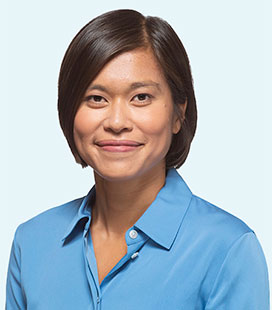
Rachelle Leong, MD, is a breast surgeon at Englewood Health and part of the Englewood Health Physician Network.
Rachelle Y. Leong, MD, is a breast surgeon at Englewood Health, where she focuses on breast cancer surgery, benign breast disease, and breast cancer in minorities and young women.“I always knew I wanted to work in cancer treatment,” says Dr. Leong. “My mother is a lung cancer survivor and has been out of treatment for over 13 years. This personal experience helps me understand both the patient and the family, and I use my family’s stories to convey to my patients that there is survivorship at the end of cancer treatment.”
How often do women need mammograms, and at what age should they start getting them?
Dr. Leong: There are conflicting recommendations, but we recommend that women with an average risk should begin having mammograms at age 40 and continue to have one every year. This helps us detect cancers as early as possible, when they are most treatable.
After some women have their annual mammogram, they are called back for an ultrasound. Why is that?
Dr. Leong: Mammograms and ultrasounds look at different things. Mammograms are great at looking at asymmetries, calcifications, and distortions while ultrasound are great at looking for cysts and solid tumors. For women with heterogeneously dense breasts, an ultrasound is recommended for further testing as a denser mammogram is harder to read.
Why do some women need a follow-up appointment after their mammogram?
Dr. Leong: We bring patients back in for a follow-up to see if anything like shape, size or appearance has changed. Such changes can be cause for concern, so sometimes we call patients back every six months to make sure everything has stayed the same.
What are the most common questions and concerns you hear from patients?
Dr. Leong: Many patients complain of breast pain and are fearful that it is a symptom of breast cancer. Breast pain is common in women, both before and after menopause. Pain can change over time with fluctuations in hormones and is not typically a cause for concern.I also see patients concerned about their family history. Because family history can increase risk, if a relative was diagnosed with breast cancer at a young age, say 45, we suggest you start yearly mammograms at age 35 rather than 40. For patients at high risk, we have genetic counselors who will help you decide whether to be tested for any abnormal gene such as BRCA and discuss the results with you if you are tested.
What are some misconceptions patients have about their breast health?
Dr. Leong: One misconception is the belief that if you have surgery for cancer , the cancer will grow when it is exposed to the open air. Exposure to air does not cause cancer to grow.
Another misconception I run across is that if you need a biopsy, it will definitely turn out to be cancer. It is human nature to believe the worst-case scenario, but often cancer is not the outcome of a biopsy. The final misconception I’ll mention occurs at the time of diagnosis. When a woman who is diagnosed with breast cancer missed her mammograms the previous year or two, she often blames herself and feels the cancer is her fault. Missing a mammogram does not cause cancer. Yes, we may have caught it earlier, but you are not to blame for the cancer.
Posted July 2019

Rachelle Leong, MD, is a breast surgeon at Englewood Health and part of the Englewood Health Physician Network.
